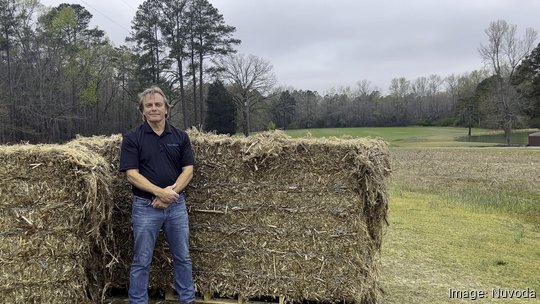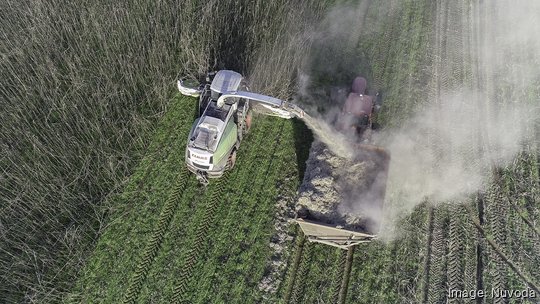
Kenaf – leafy bamboo-like stalks cultivated in Asia for twine and cloth – could end up in wastewater treatment plants around the world as part of the business model for a Raleigh company trying to change the process for water reclamation.
Nuvoda, a biologics firm with a kenaf farm and a 25,000-square-foot plant in Moore County, processes the stalks, grinding them to particles before reassembling them into briquettes – compressed blocks. The briquettes – once shipped to wastewater treatment facilities throughout North America – and, thanks to some recent contract wins, the U.K. – will be dropped into the wastewater where the particles disburse.
The secret behind the company's model is the surface area of the particles, which come from the core of the Kenaf stalk, said CEO Jonathan Lister, who joined the company three years ago.
“And it doesn’t break down under biological wastewater conditions,” he said.
The particles are the media for biofilm to grow. And the biofilm growing on that kenaf “backbone” works to reduce “fertilizer nutrients" – phosphates and nitrogen “that you definitely don’t want hitting your receiving bodies of water," Lister said.

Nuvoda sells the materials as a way to extend the capacity capabilities of existing wastewater treatment plants – and customers are buying in, such as the wastewater plant in Mebane, which was one of the first plants to come onboard during the research and development phase more than a decade ago.
“Right now we are booming,” Lister said from the company’s headquarters off of Glenwood Avenue in Downtown Raleigh. “We’ve got full-scale installations across the United States, and we have a lot of projects in Canada and in the U.K.”
And early conversations are in progress with potential partners in Europe.
Part of the reason the technology is attracting so many eyeballs is that it’s green – unlike the plastic, pasta-like materials that offer a competing biofilm backbone.
“We don’t release microplastics in the process,” Lister said.
In a world where more and more municipalities have net-zero goals, the sustainability sell gives the technology an advantage, he said. And a growing population – particularly in the Southeast U.S. – is also driving demand. More people means more “fertilizer” that needs to be treated, Lister said.
“They all have to increase their capacity,” he said of the wastewater plants. Projects range in price tag from $500,000 to as much as $5 million, though they’re typically on the lower end of that range, Lister said.
But there are challenges.
The bulk of the material comes from the farm in Moore County (some also comes from a farm in Haiti). The company has to plan out its inventory – a balancing act, Lister said.
The next challenge is the competition. Nuvoda is doing something entirely new – which always requires education on part of the customer.
And it’s also growing – which brings another big challenge.
“We’ve rapidly gone from a handful of projects to many handfuls of projects,” he said. “You need both tools and you need people, and people in our business … they’re not everywhere.”
Now that the company is shifting from R&D to full-scale commercialization – it recently became profitable – it needs to scale up in order to meet demand. Hiring engineering talent, particularly workers with experience in the biologics and wastewater space, is difficult. Nuvoda has a partnership with N.C. State University that has helped with recruitment, but the growth is coming quickly. Since Lister came on board, the company has doubled in size to 15 people. And in the next year, it plans to add another 10 workers, primarily in engineering.
The market opportunity is huge, as there are about 10,000 wastewater plants where this type of technology could be applied, Lister estimates.
Replenishment is part of the business. Each year, about 2 to 5 percent of the initial kenaf material will need to be re-added to the wastewater to keep the film going.
Lister declined to give financial specifics, but said “it looks pretty strong.”
“There’s quite a number of projects per year … you can get some idea,” he said, adding that the firm has been privately funded, including from local businessman Worth Harris, who chairs Nuvoda’s board.
It’s a big enough economic profile to attract exit interest – though it’s not something the firm is pursuing. It’s had interest “but we’ve not followed through,” Lister said.
“We’re really excited about where we are,” he said.
Lister came to Nuvoda from the Atlanta area, where he was vice president of global water at Lonza Water Care. There, he had global responsibility – which makes him particularly excited for the potential world-wide reach of Nuvoda, he said.